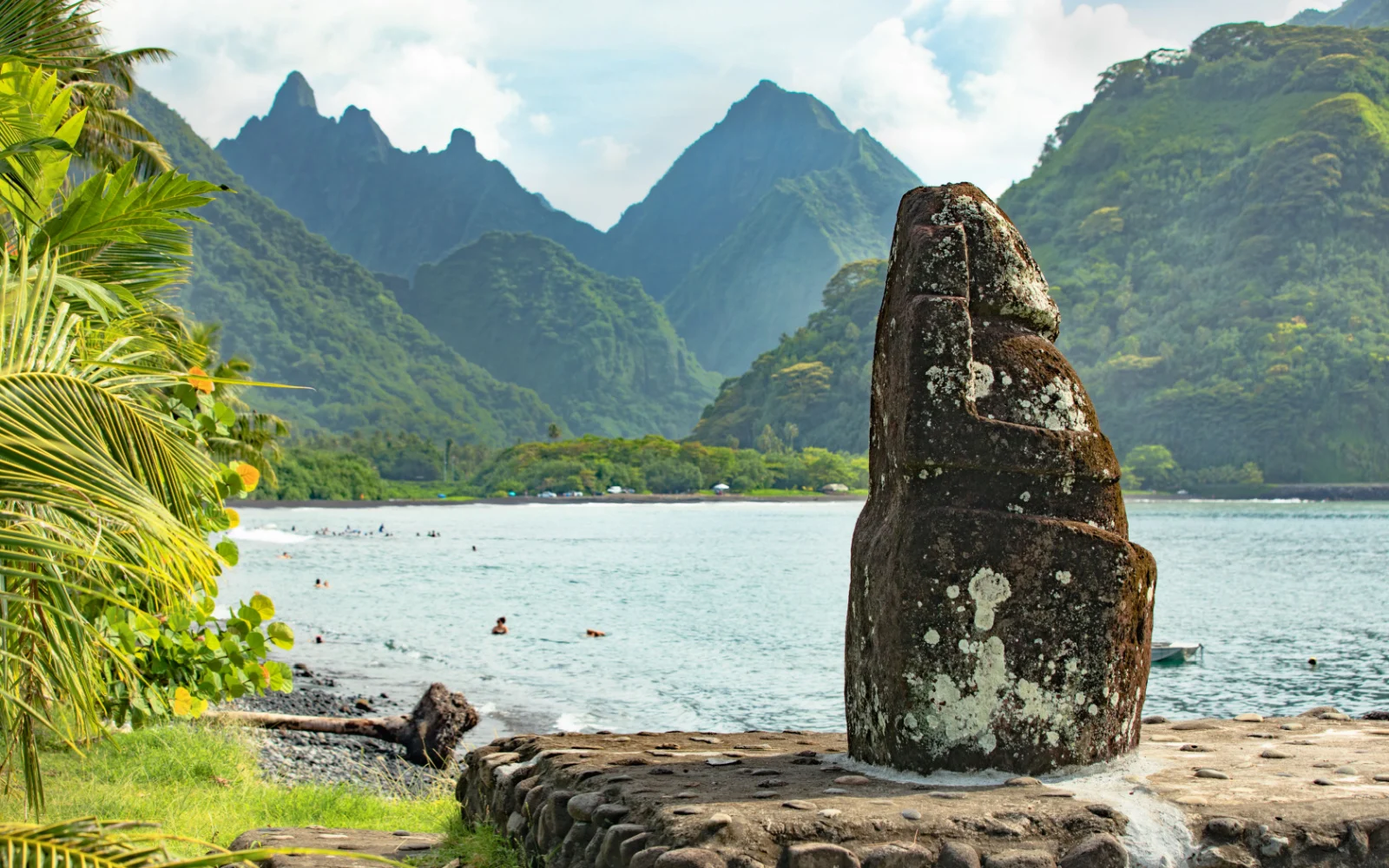French Polynesia is a bucket list destination for many people. The beautiful tropical island chain, a popular destination among honeymooners and luxury travelers, receives about 300,000 visitors per year even though it has a population of only about 285,000 people.
The best thing to do in French Polynesia is obviously to lay on the beach.
Whether you choose to stay in one of Bora Bora’s famous resorts, take a cruise ship to Moorea, or enjoy the public beaches of Tahiti, almost anywhere you go, you’re guaranteed to find pristine sand and crystal-clear waters.
French Polynesia also has plenty of beautiful nature, such as the crags of Belvedere Lookout or the Fa’aruma’i Waterfalls. There is so much to see and do that it is absolutely worth the often long trip to get there.
However, before making the trip, you might be wondering about other practical concerns such as your safety. But don’t worry — our travel experts have done the hard work for you.
We put together this travel guide to help you figure out the safest way to travel to French Polynesia. Keep reading for detailed information, including about crime. Let us be your guide!
Is French Polynesia Safe to Visit in 2025?
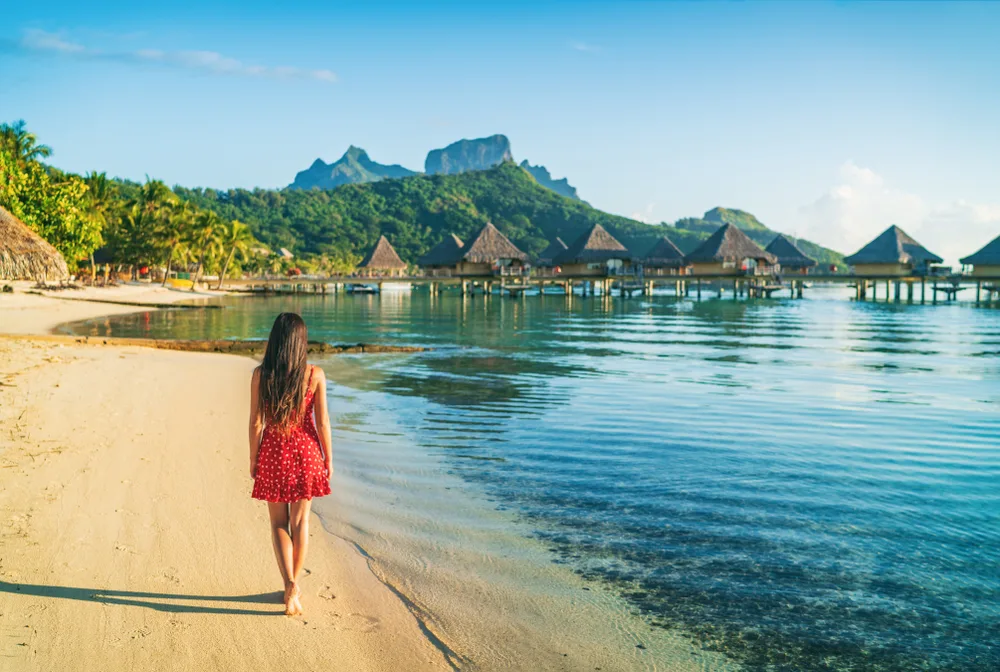
Maridav/Shutterstock
Yes. French Polynesia is one of the safest holiday destinations in the world. Besides some petty crime, you won’t encounter many problems while you are there.
Make sure that you are also careful of the natural world, as many popular activities in French Polynesia such as scuba diving come with some degree of risk. French Polynesia is not a fully independent country.
Instead, as the name states, it is an overseas country that is part of France. Still, many countries have their own travel advisories for French Polynesia that are separate from their advice for the rest of France.
These travel advisories are a great place to start researching the safety of a trip to French Polynesia. Most advisories agree that French Polynesia is incredibly safe to visit.
The United States doesn’t even bother issuing detailed advice, just telling its citizens to exercise normal precautions while they are there. Other countries, such as New Zealand, also have the lowest possible travel advisory in place for French Polynesia.
In their travel advisories, countries mention common problems you might encounter in French Polynesia such as:
- Pickpocketing
- Purse snatching
- Drink spiking
- Sexual harassment and assault
The vast majority of crimes that occur in French Polynesia are petty crimes. Violent crime is extremely rare. Civil unrest sometimes occurs in French Polynesia. As in other parts of France, labor union strikes are common.
Some observers are nervous about political tensions after the independence movement won the most recent elections, but so far there have been no problems.
If protests do occur, they will most likely be confined to the capital Papeete. As a precaution, when you see crowds gathering, leave the area in case a protest might turn violent. The natural world is a bigger threat to your safety than the threat of other people.
The pristine waters hide all sorts of wildlife. Most people know to be wary of sharks, but the venomous stonefish is arguably more dangerous.
If you step on a stonefish, seek medical attention immediately. Some beaches are safer than others. Ask for local advice before swimming. They can tell you where there have been shark sightings recently, or which beaches have strong currents.
Adventure tours are popular, but before going on a hike or other outdoor adventure, read up on safety information carefully and save emergency numbers.
If you are going through an organized tour, make sure that the tour you choose is carefully vetted and has safety certificates. Like many tropical destinations, French Polynesia can experience natural disasters.
The UK government warns in its travel advisory that cyclones and other tropical storms can occur from November to April.
If you are traveling during the rainy season, check on the High Commission of France in French Polynesia’s website for any breaking news updates (the site is in French, but you can use Google Translate).
Crime in French Polynesia
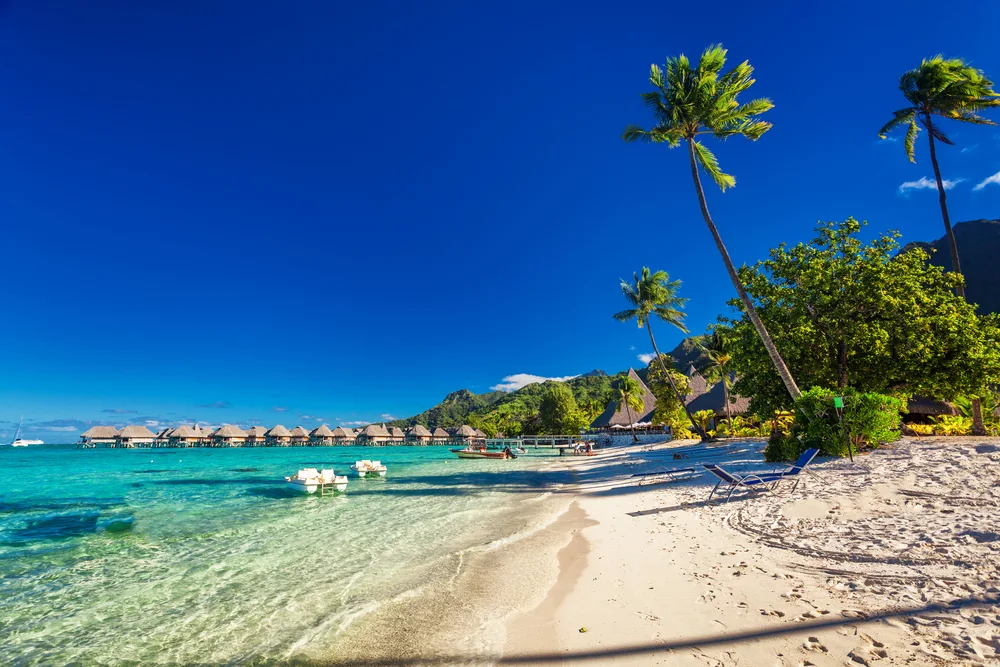
Martin Valigursky/Shutterstock
When you visit any new place, crime is a primary worry. After all, when you are traveling, you don’t know how to protect yourself the way that you do at home.
Luckily, French Polynesia is not one of those places where you need to be on your guard when it comes to safety at all times, as the island country has a very low crime rate.
There is some property crime that happens, but rates of violent crime are nearly nonexistent. The intentional homicide rate is 0.38 incidents per 100,000 people. That means that the country only sees about one homicide per year.
Rates of other violent crimes are similarly low. Property crime exists, but the rate of property crime is not very high. According to Numbeo, French Polynesia scores an 17.38 out of 100 on the crime index, which is a very low value.
Some people report that crime has increased over the past few years. Others are concerned about minor property crimes such as vehicle break-ins, drug abuse, vandalism, and theft.
Most residents, expats, and visitors to French Polynesia agree that the place feels perfectly safe. Anecdotal evidence from previous travelers gushes about how safe all of the islands feel. There are a few reasons why crime in French Polynesia is fairly low.
An important factor is probably the relatively high income of islanders compared to other countries in Polynesia. You shouldn’t let this feeling of safety put an end to all of your precautions.
Crime can occur anywhere, even in a paradise such as French Polynesia, and you don’t want to leave your valuables unattended or do other careless things. However, you shouldn’t let worrying about crime ruin your vacation.
Petty Theft
The crime that you are most likely to encounter in French Polynesia is petty theft. This is similar to what you might expect from any tourist destination.
Places that are tourist economies often experience petty theft as tourists are often easy, lucrative targets for criminals. The Canadian government warns its citizens about the potential for petty theft in French Polynesia.
The most common forms of theft are pickpocketing and purse snatching. These thefts are more common in Papeete, the capital, or busy cruise ship ports, where there are many crowds.
The same basic precautions you might take to protect your valuables elsewhere will serve you well. Don’t leave valuables, especially your wallet and documents, unattended anywhere that you go.
This includes the beach, as unwitting tourists sometimes leave expensive cameras and phones on the beach while they’re swimming, only to come back and find only their towel waiting.
Break-ins, both residential and vehicular, are on a slight increase in French Polynesia. You might want to take some precautions to prevent those as well.
When choosing your accommodation, research their safety as there have been break-ins to hotels and resorts before, even in popular destinations such as Bora Bora.
Ask your hotel or resort what precautions they have to protect guests, such as security personnel. Always put your valuables in a room safe. If you are renting a car, know that there have been vehicle break-ins on the islands in the past.
When you park the car, make sure that you lock the doors and close the windows (you’d be surprised how many visitors and residents of French Polynesia skip this step). Don’t leave valuables out where they are visible.
Gender-Based Violence
Female travelers may face additional challenges in French Polynesia. Most women in French Polynesia have a great time. Those that have negative experiences mostly report sexual harassment, usually verbal harassment such as catcalling.
While minor, this form of harassment can ruin a previously pleasant vacation. In French Polynesia’s party areas, such as the capital Papeete, more dangerous situations can happen.
The Australian government warns about the risk of drink spiking. Foreign women are often targeted with excess alcohol or date rape drugs by criminals.
If you check out the nightlife of French Polynesia, make sure that you always keep a firm eye on your drinks. There have been cases where female travelers were sexually assaulted in the past, by locals but often by fellow foreigners.
The Guardian published an expose about ship captains in the Pacific, including French Polynesia, that assault female crewmembers that sign on to work on their ships.
Whenever you are going on an activity to an isolated area, make sure that you thoroughly vet the organizer and that someone always knows where you are at all times.
You should also be careful with your movements around the island country to minimize your risk of assault whenever possible.
Avoid walking on isolated beaches at night as that is when many incidences of sexual harassment occur. Some of Papeete’s side streets are also more dangerous for women after dark.
Avoiding Bad Areas
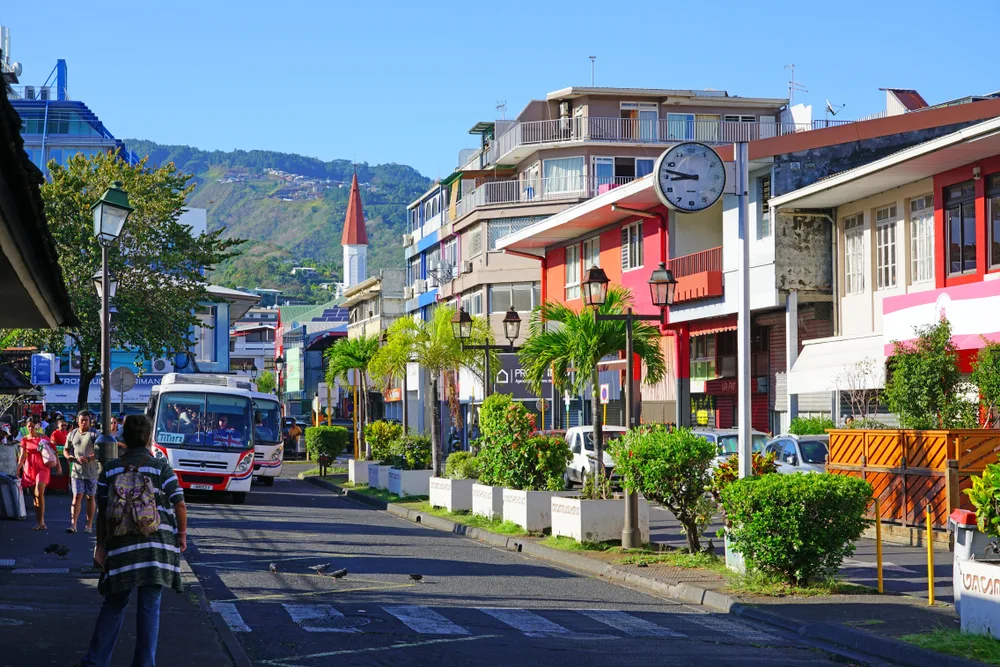
PAPEETE, TAHITI -30 NOV 2018- View of downtown Papeete, Tahiti, the capital of French Polynesia/EQRoy/Shutterstock
Most of French Polynesia is incredibly safe. The only place where you will have to exercise more precautions is the capital Papeete. Many visitors advise against walking around at night except on boulevard Pomare.
The dark side streets often have high levels of street crime. The bar areas of Papeete can also get very rowdy at night, which might be uncomfortable particularly for women.
Petty crime increases around port areas in the islands, as thieves use the crowds as cover to steal from people. Keep a firmer grasp on your valuables in those areas. Also, try not to walk on the beaches after dark.
Things to Consider
Here are a few additional safety tips for traveling to French Polynesia:
- The sun in French Polynesia is very strong. Take precautions to protect yourself such as applying plenty of sunscreen, drinking lots of water, and staying out of the sun during the hottest part of the day.
- If you get a cut, treat it immediately. Apply antibacterial ointment and a bandage. Cuts can easily get infected in tropical areas such as French Polynesia. You can get cuts from coral and other sharp objects in the water, so invest in water shoes.
- Bug bites are common in French Polynesia. Although there is no malaria, there is some risk of dengue fever and other mosquito-borne diseases. Use tools such as bug spray and mosquito repellent coils to ward off bites.
- There are no lifeguards. Swimming in the lagoons is usually safe. Still, check with locals before getting into the water and obey any signs with posted warnings.
Frequently Asked Questions
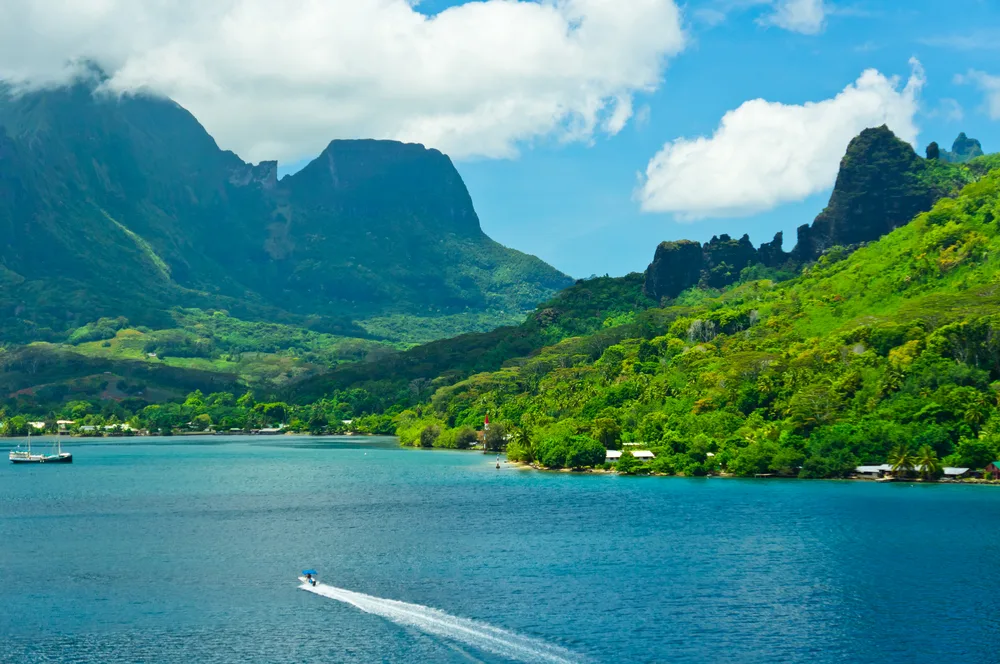
mffoto/Shutterstock
Here are some other questions you might want answered before visiting French Polynesia:
Is Bora Bora safe to visit?
Bora Bora is one of the safest places in French Polynesia. The crime rate is extremely low, with only a few petty crime incidents and driving violations each year.
Is it safe to swim in French Polynesia?
Most beaches in French Polynesia are safe to visit as they are in lagoons, which are protected from the dangers of the open ocean. However, some can have strong currents and tides.
Some of the marine wildlife in French Polynesia is also dangerous. Many beaches have sharks, although they rarely attack humans. Poisonous stonefish that live on the bottom of the reef are more dangerous.
Are people in French Polynesia friendly?
Yes, people in French Polynesia are generally very friendly. The island culture is famous for its hospitality.
Is French Polynesia cheap or expensive?
French Polynesia is a very expensive holiday destination. First, getting there is expensive as flights are long and costly. Most accommodation options are resorts, although you can find more budget options such as guest houses.
Do tsunamis happen in French Polynesia?
Tsunamis happen sometimes in French Polynesia, but they are extremely rare, only occurring every few decades. Tsunamis only happen when there is a strong earthquake elsewhere in the Pacific Ocean.
So, Is It Safe to Visit French Polynesia?
French Polynesia is one of the safest places in the world to visit (if you can afford a trip there). The crime rate is very low, and violent crime is nearly nonexistent. So what are you waiting for — book your trip today!



